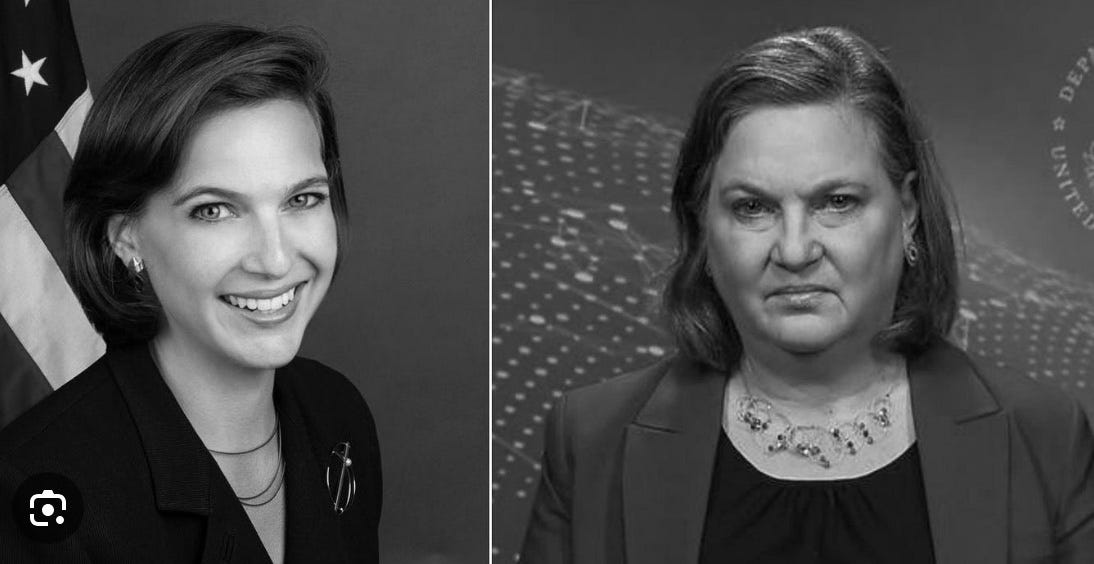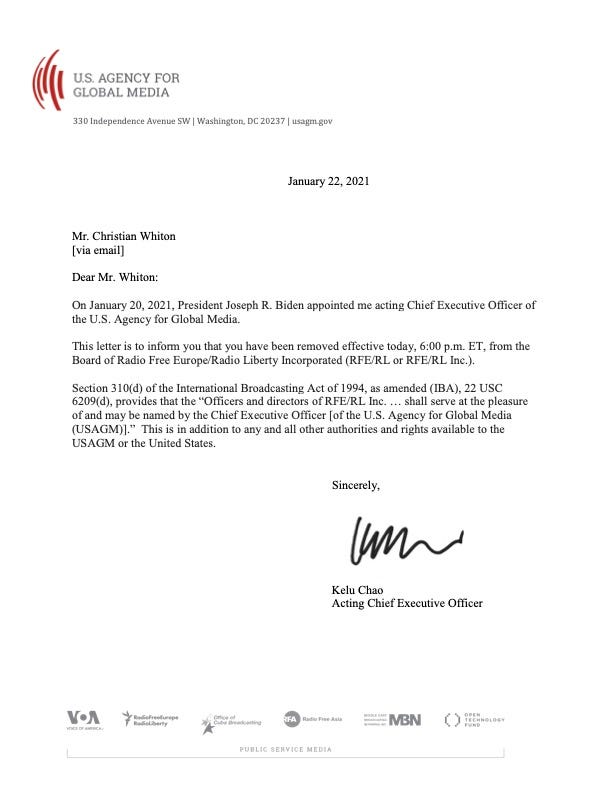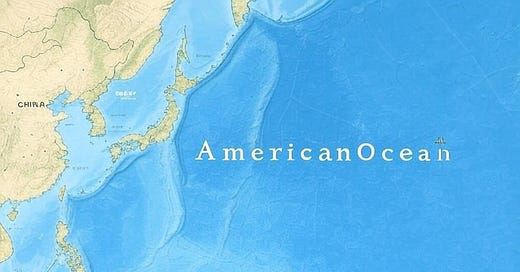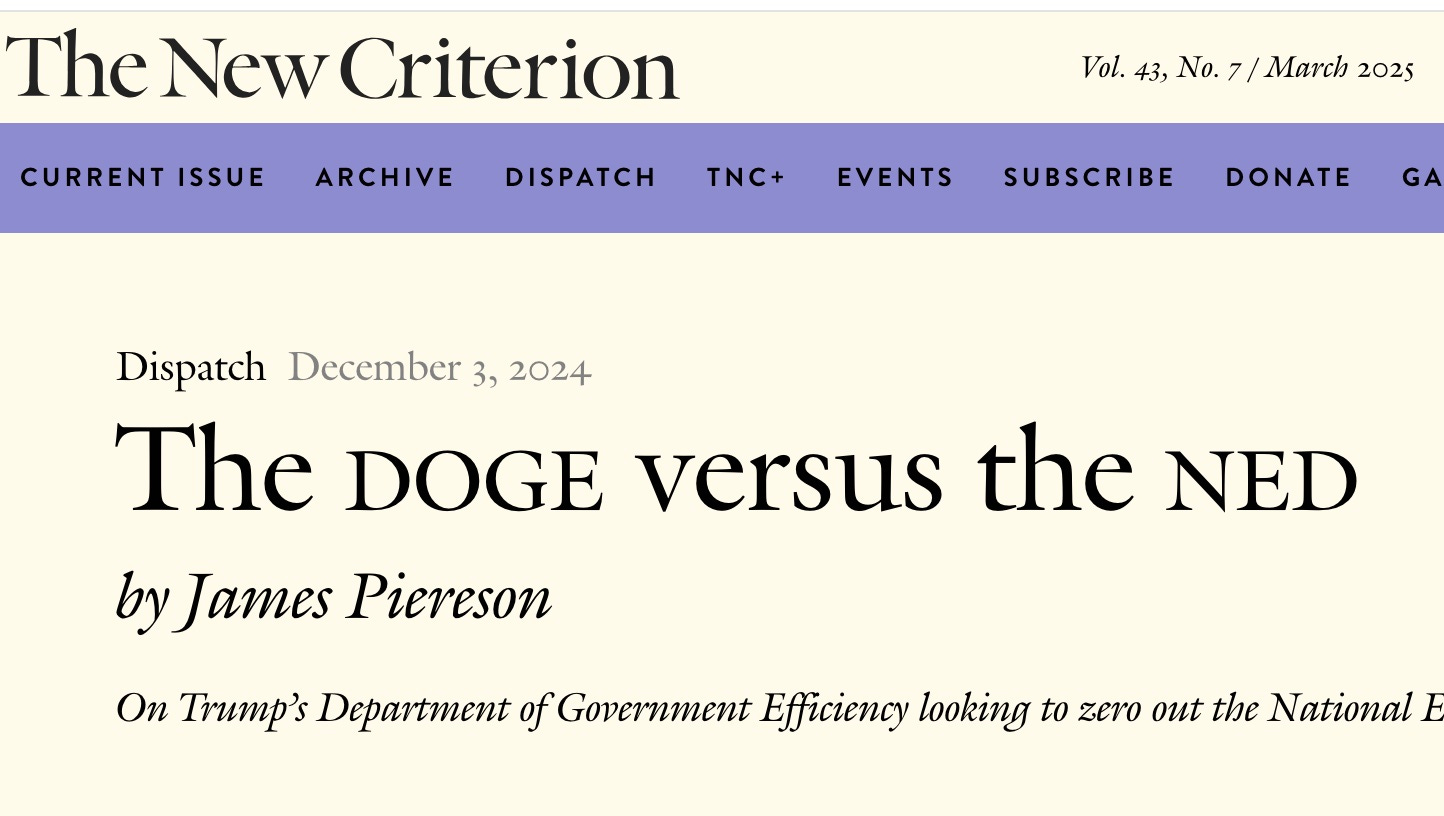Trump Not Pulling Back in Asia, Just Ending Democracy-Industrial Complex
PLUS: If Biden could fire me, Trump can fire globalists and repurpose failed broadcasters and gravy train "N"GOs.
Apparently, the situation is dire: under Trump, America is pulling back from Asia and handing out goodies to China and its dictator Xi Jinping.
Dan Twining of the government-funded International Republican Institute, which faces eliminatation, warned, “One thing we don’t want to do is take team America off the field.”
Referring to an alphabet soup of similar entities that get their money from Uncle Sam, Evan Feigenbaum, who describes himself as a “leading Asia expert experienced across government, markets, and think tanks,” worried about other prospective eliminations:
USAID, ONA, VOA, RFA, USAGM, USIP, WWC… and that’s just agencies, not cuts to activities. Neutering the ability to compete, research, and think is not really a recipe for remaining as a major power.
He is referring to the U.S. Agency for International Development, the Defense Department’s Office of Net Assessment, the U.S. Agency for Global Media, the U.S. Institute for Peace, and the Woodrow Wilson Center. When combined with the National Endowment for Democracy, which Trump also seeks to curtail, these form a good compilation of what can be called the U.S. government’s democracy-industrial complex.
The organizations and their enthusiasts claim they are essential.
Lisa Curtis, an ex-CIA official and aide on the Trump first term National Security Council staff, asserted:
The effort to try to halt the work of Radio Free Europe/Radio Liberty is equivalent to trying to stop the march of global freedom. America must not unilaterally disarm in the face of our adversaries’ disinformation campaigns and restrictions on freedom of the media.
Michael Abramowitz, the former director of the shuttered Voice of America (VOA) said, “VOA promotes freedom and democracy around the world by telling America’s story and by providing objective and balanced news and information, especially for those living under tyranny.”

In a report posted from China, the New York Times headlined a story about the possible elimination of VOA and Radio Free Asia: “Chinese Nationalists Praise Trump’s Cuts to Voice of America.” Quoting someone who works for something called the China Media Project, the Times reported: “Against this backdrop, the actions of the Trump administration are cause for enthusiastic celebration [in China]. In a matter of weeks, Trump seems to have slit the throat of American influence.” The Committee to Protect Journalists said the moves against the government-funded “independent organizations” are a “reward to dictators and despots.”
One of several problems is that these claims are evidence free. These organizations can point to no recent accomplishments in the real world (attending conferences doesn’t count). The media organizations claim no scoops, have few real followers, and aren’t even clearly pro-American.
I briefly served on the boards of directors of Radio Free Asia and Radio Free Europe/Radio Liberty and I have worked with those who have struggled against the Chinese government for more than two decades. Never once has a dissident said without prompting that these organizations have made a difference.

Working specifically on North Korean human rights issues at the State Department in the George W. Bush administration, we were told by those who escaped North Korea or who helped refugees that VOA’s Korean service was of little concern to the regime given its pointless content. Radio Free Asia was slightly less irrelevant since it attempted to localize news. However, what really upset the regime, and what attracted its greatest jamming efforts, were broadcasts by defectors operating on a shoestring budget of private donations. David was more effective than Goliath in putting the heat on our adversaries.
Most of these organizations were created during the Cold War. Instead of being shuttered with the demise of the Soviet Union, they trundle on, most with vastly larger budgets of taxpayer money. For example, the National Endowment for Democracy received $29 million from the federal government in 1991, the year the Soviet Union passed into history—an amount equivalent to $69 million today adjusting for inflation.
By 2003, with the War on Terror at full speed, it banked $54 million from Uncle Sam ($95 million today).
By 2023, its government handout had grown to a whopping $362 million. The organization describes itself as an “independent, nonprofit foundation,” but according to its own financial disclosures, fully 99.9% of its total grants and contributions came from the U.S. government. The organization has sued the government claiming its funding cannot be cut in a case ironically titled “National Endowment for Democracy vs. United States of America.”
That title pretty well sums up the trajectory of the democracy-industrial complex. What began as a modest effort to operationalize a bipartisan consensus to challenge Soviet-backed governments ideologically and through information warfare during the Cold War has become a big business that cannot point to any real success.
Worse than merely wasting money, the complex’s operations involve not just an ineffective attempt to undermine communism, but have morphed into an effort to undermine Trump and politicians like him around the world who seek to curb globalism. In a damning exposé of the National Endowment for Democracy and its Trump-deranged leaders written in the New Criterion, James Piereson noted:
… [It] has evolved into a den of never-Trumpers, progressives, and Democrats who have said that President-elect Trump is an “authoritarian” or a “fascist” who will end America’s constitutional order. This is in keeping with the NED’s vision of democracy, which rules out popular movements led by the likes of Donald Trump.
Piereson also accurately details how the Endowment has become part of the Left’s scheme to censor people and news outlets that don’t toe the globalist line through the Orwellian tactic of labeling their reporting as “misinformation.” It has been particularly effective in reducing advertising revenue for mainstream news organizations that lean toward the New Right.
Clearly, the decision by Trump officials to curtail these organizations, which often have ranged from ineffective to nefarious, does not indicate a desire to pull back from Asia or make nice with the Chinese government. On the contrary, the move shows that the Trump administration is reforming U.S. national power—in this case what is often called “soft power”—from something that is wasteful and ineffective into something more focused on defending America and its allies and backfooting China.
Curbing the democracy-industrial complex goes hand in hand with higher tariffs, ending the Ukraine War, renewing relations with Russia, and other features of America First foreign policy—all of which are also condemned by those hyperventilating about defunding the democracy-industrial complex.
For example, the New York Times asserted last month that Trump’s coming tariffs and other developments confront Taiwan with a new environment:
…one that does not focus on shared democratic ideals, and that is more uncertain and transactional. Mr. Trump has accused Taiwan of spending far too little on its own security and of gaining an unfair dominance in making semiconductors.
The insinuation that the democracy-industrial complex and Trump’s predecessor were focused on Taiwan and “shared democratic ideals” is ludicrous, unless the Times is talking about Taiwan’s celebration of its transvestite boxer who brought home Olympic gold in domestic abuse last year. There is also a fevered whisper campaign suggesting senior Trump administration officials have privately abandoned Taiwan to eventual Chinese takeover—a point that is difficult to prove given Trump’s team’s energetic effort to refocus the military on the Pacific and reform it, saving money and increasing lethality, based on the lessons of the Ukraine War.
Trump’s commitment to U.S. allies that are increasing their defense spending like Japan shows he is not “transactional.” His care for Americans and others detained unjustly abroad—he said during the campaign he would try to get Hong Kong dissident Jimmy Lai out of China—also indicate a traditional American foreign policy that weaves together national interests and values.

Furthermore, Xi Jinping does not worry about conferences in Washington or Brussels discussing abstractions about liberal democracy, homages to a rules-based international order that never existed, virtue signaling about Ukraine, or similar enthusiasms of the democracy-industrial complex. What he does worry about is an America that will strengthen itself economically through tariffs, strengthen itself militarily by ending the war in Ukraine and ceasing to push Russia into China’s arms, and strengthen itself fiscally and culturally by ending the gravy train for people who preen about promoting democracy globally while instead trying desperately to save a globalist elitism that harmed America and helped China.
How it’s Done - Domino Theory
In this excerpt of a previous edition of Domino Theory, former Trump deputy U.S. Trade Representative C.J. Mahoney discusses how Japan serves as a model for how countries should react to U.S. tariffs and trade talks.








I usually enjoy Christian's perspectives but am scratching my head on this one. It's hard to reconcile the notion that these institutions accomplished nothing with the celebratory fervor from China and Russian state organs over their demise. https://www.globaltimes.cn/page/202503/1330246.shtml